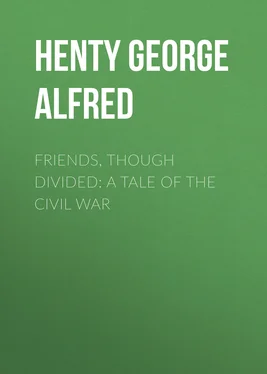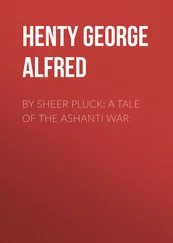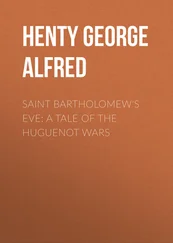George Henty - Friends, though divided - A Tale of the Civil War
Здесь есть возможность читать онлайн «George Henty - Friends, though divided - A Tale of the Civil War» — ознакомительный отрывок электронной книги совершенно бесплатно, а после прочтения отрывка купить полную версию. В некоторых случаях можно слушать аудио, скачать через торрент в формате fb2 и присутствует краткое содержание. Жанр: foreign_children, foreign_antique, foreign_prose, prose_military, на английском языке. Описание произведения, (предисловие) а так же отзывы посетителей доступны на портале библиотеки ЛибКат.
- Название:Friends, though divided: A Tale of the Civil War
- Автор:
- Жанр:
- Год:неизвестен
- ISBN:нет данных
- Рейтинг книги:3 / 5. Голосов: 1
-
Избранное:Добавить в избранное
- Отзывы:
-
Ваша оценка:
- 60
- 1
- 2
- 3
- 4
- 5
Friends, though divided: A Tale of the Civil War: краткое содержание, описание и аннотация
Предлагаем к чтению аннотацию, описание, краткое содержание или предисловие (зависит от того, что написал сам автор книги «Friends, though divided: A Tale of the Civil War»). Если вы не нашли необходимую информацию о книге — напишите в комментариях, мы постараемся отыскать её.
Friends, though divided: A Tale of the Civil War — читать онлайн ознакомительный отрывок
Ниже представлен текст книги, разбитый по страницам. Система сохранения места последней прочитанной страницы, позволяет с удобством читать онлайн бесплатно книгу «Friends, though divided: A Tale of the Civil War», без необходимости каждый раз заново искать на чём Вы остановились. Поставьте закладку, и сможете в любой момент перейти на страницу, на которой закончили чтение.
Интервал:
Закладка:
The chroniclers describe how wild a scene of confusion reigned in London that evening. Proclamations were issued ordering all men to take up arms; shops were closed, the apprentice boys mustered in the ranks, and citizens poured out like one man to defend the town. They encamped upon the road, and the next day great trains of provisions sent by the wives of the merchants and traders reached them, and as many came out to see the forces, the scene along the road resembled a great fair.
In this fight at Brentford Harry Furness was engaged. The Royalists had anticipated no resistance here, not knowing that Hollis held the place, and Sir Henry did not think of ordering Harry to remain behind. At the moment when it was found that Hollis was in force and the trumpets sounded the charge, the lad was riding in the rear of the troop, talking to one of the officers, and his father could take no step to prevent his joining. Therefore, when the trumpets sounded and the troops started off at full gallop toward the town, Harry, greatly exulting in his good luck, fell in with them and rode down the streets of Brentford. The musketry fire was brisk, and many of the troop rolled from their horses. Presently they were dismounted and ordered to take the houses by storm. With the hilts of their swords they broke in the doors, and there was fierce lighting within.
Harry, who was rather bewildered with the din and turmoil of the fight, did as the rest, and followed two or three of the men into one of the houses, whose door had been broken open. They were assailed as they entered by a fire of musketry from the Parliament men within. Those in front fell, and Harry was knocked down by the butt of a pike.
When he recovered he found himself in a boat drifting down the stream, a prisoner of the Roundheads.
For a long time Harry could hear the sounds of the guns and cannon at Brentford, and looking round at the quiet villages which they passed on the banks, could scarce believe that he had been engaged in a battle and was now a prisoner. But little was said to him. The men were smarting under their defeat and indulged in the bitterest language at the treachery with which, after negotiations had been agreed upon, the advance of the Royalists had been made. They speedily discovered the youth of their captive, and, after telling him brutally that he would probably be hung when he got to London, they paid no further attention to him. The boat was heavily laden, and rowed by two oars, and the journey down was a long one, for the tide met them when at the village of Hammersmith, and they were forced to remain tied up to a tree by the bank until it turned again. This it did not do until far in the night, and the morning was just breaking when they reached London.
It was perhaps well for Harry that they arrived in the dark, for in the excited state of the temper of the citizens, and their anger at the treachery which had been practiced, it might have fared but badly with him. He was marched along the Strand to the city, and was consigned to a lock-up in Finsbury, until it could be settled what should be done to him. In fact, the next day his career was nearly being terminated, for John Lilburn, a captain of the Train Bands, who had been an apprentice and imprisoned for contumacy, had been captured at Brentford, and after being tried for his life, was sentenced to death as a rebel. Essex, however, sent in word to the Royalist camp that for every one of the Parliament officers put to death, he would hang three Royalist prisoners. This threat had its effect, and Harry remained in ignorance of the danger which had threatened him.
The greatest inconvenience which befell him was that he was obliged to listen to all sorts of long harangues upon the part of the Puritan soldiers who were his jailers. These treated him as a misguided lad, and did their best to convert him from the evil of his ways. At last Harry lost his temper, and said that if they wanted to hang him, they might; but that he would rather put up with that than the long sermons which they were in the habit of delivering to him. Indignant at this rejection of their good offices, they left him to himself, and days passed without his receiving any visit save that of the soldier who brought his meals.
CHAPTER IV.
BREAKING PRISON
Harry's place of confinement was a cell leading off a guardroom of the Train Bands. Occasionally the door was left open, as some five or six men were always there, and Harry could see through the open door the citizens of London training at arms. Several preachers were in the habit of coming each day to discourse to those on guard, and so while away the time, and upon these occasions the door was generally left open, in order that the prisoner might be edified by the sermons. Upon one occasion the preacher, a small, sallow-visaged man, looked into the cell at the termination of his discourse, and seeing Harry asleep on his truckle bed, awoke him, and lectured him severely on the wickedness of allowing such precious opportunities to pass. After this he made a point of coming in each day when he had addressed the guard, and of offering up a long and very tedious prayer on behalf of the young reprobate. These preachings and prayings nearly drove Harry out of his mind. Confinement was bad enough; but confinement tempered by a course of continual sermons, delivered mostly through the nose, was a terrible infliction. At last the thought presented itself to him that he might manage to effect his escape in the garb of the preacher. He thought the details over and over in his mind, and at last determined at any rate to attempt to carry them into execution.
One day he noticed, when the door opened for the entry of the preacher, that a parade of unusual magnitude was being held in the drill yard, some officer of importance having come down to inspect the Train Band. There were but four men left in the guardroom and these were occupied in gazing out of the window. The preacher came direct into the cell, as his audience in the guardroom for once were not disposed to listen to him, and shutting the door behind him, he addressed a few words of exhortation to Harry, and then, closing his eyes, began a long prayer. When he was fairly under way, Harry sprang upon him, grasping him by the throat with both hands, and forced him back upon the bed. The little preacher was too much surprised to offer the smallest resistance, and Harry, who had drawn out the cords used in supporting the sacking of the bed, bound him hand and foot, keeping, while he did so, the pillow across his face, and his weight on the top of the pillow, thereby nearly putting a stop to the preacher's prayers and exhortations for all time. Having safely bound him, and finding that he did not struggle in the least, Harry removed the pillow, and was horrified to see his prisoner black in the face. He had, however, no time for regret or inquiry how far the man had gone, and stuffing a handkerchief into his mouth, to prevent his giving any alarm should he recover breath enough to do so, Harry placed his high steeple hat upon his head, his Geneva bands round his throat, and his long black mantle over his shoulders. He then opened the door and walked quietly forth. The guards were too much occupied with the proceedings in the parade ground to do more than glance round, as the apparent preacher departed. Harry strode with a long and very stiff step, and with his figure bolt upright, to the gate of the parade ground, and then passing through the crowd who were standing there gaping at the proceedings within, he issued forth a free man.
For awhile he walked at a brisk pace, and then, feeling secure from pursuit, slackened his speed; keeping westward through the city, he passed along the Strand and out into the country beyond. He wore his beaver well down over his eyes, and walked with his head down as if meditating deeply, in order to prevent any passers-by from observing the youthfulness of his face. When he arrived at the village of Chelsea, he saw, in front of a gentleman's house, a horse hitched up to a hook placed there for that purpose. Conceiving that for a long journey four legs are much more useful than two, and that when he got beyond the confines of London he should attract less suspicion upon a horse than if striding alone along the road, he took the liberty of mounting it and riding off. When he had gone a short distance he heard loud shouts; but thinking these in no way to concern him, he rode on the faster, and was soon beyond the sound of the voices. He now took a northerly direction, traveled through Kensington, and then keeping east of Acton, where he knew that some Parliament troops were quartered, he rode for the village of Harrow. He was aware that the Royalists had fallen back to Oxford, and that the Parliament troops were at Reading. He therefore made to the northwest, intending to circuit round and so reach Oxford. He did not venture to go to an inn, for although, as a rule, the keepers of these places were, being jovial men, in no way affected toward the Commons, yet he feared meeting there persons who might question and detain him. He obtained some provision at a small village shop, in which he saw a buxom woman standing behind her counter. She appeared vastly surprised when he entered and asked for a manchet of bread, for the contrast between his ruddy countenance and his Puritan hat and bands was so striking that they could not fail to be noticed. The good woman looked indeed too astonished to be able to attend to Harry's request, and he was obliged to say, "Mother, time presses, and I care not to be caught loitering here."
Читать дальшеИнтервал:
Закладка:
Похожие книги на «Friends, though divided: A Tale of the Civil War»
Представляем Вашему вниманию похожие книги на «Friends, though divided: A Tale of the Civil War» списком для выбора. Мы отобрали схожую по названию и смыслу литературу в надежде предоставить читателям больше вариантов отыскать новые, интересные, ещё непрочитанные произведения.
Обсуждение, отзывы о книге «Friends, though divided: A Tale of the Civil War» и просто собственные мнения читателей. Оставьте ваши комментарии, напишите, что Вы думаете о произведении, его смысле или главных героях. Укажите что конкретно понравилось, а что нет, и почему Вы так считаете.












